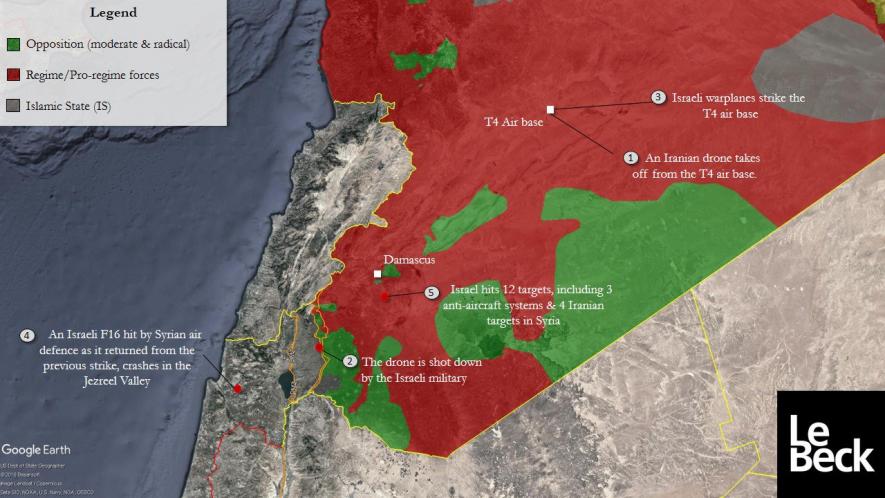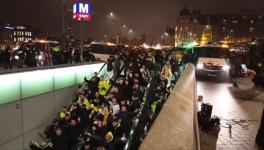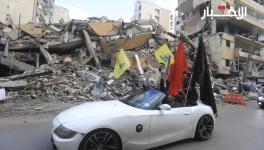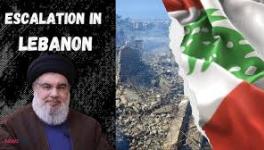Israel Tries to Poke its Nose in Syria, Finds its F-16 Shot Down

image Courtesy: LeBeck
Syrian air defence batteries on Saturday shot down an Israeli F16 aircraft that had violated the Syrian airspace. According to the Israeli military, its fighter aircrafts were tracking an Iranian drone that had crossed into the Israeli territory, and the jets were targeting the Iranian control system at the T4 military base in Syria.
But experts point out that the Israeli claim of an Iranian drone has not been independently verified. According to veteran journalist, Elijah J. Magnier Syrian skies have “more drones than birds” belonging to various militaries that function in the territory, and Israeli claim of a drone being Iranian is a more of a finger pointing – an excuse to poke its nose in Syria against Iran.
Though that shooting down of Israeli aircraft had a negligible effect on its military infrastructure, strategically and politically it’s a big set back for Tel Aviv. It’s the first Israeli jet that had been shot down by Syrian air defence since 1982!
In retaliation for the shooting down of its plane, Israeli Army said it launched "large-scale attacks" against the aerial defence system and Iranian targets in Syria. The Israeli claim – to have neutralized “half of the Syrian air defence system” – is something that needs to be independently verified.
Twelve targets, including three anti-aircraft batteries and four Iranian targets, “which were part of Iran's military establishment in Syria, were attacked,” according to a statement by the Israeli Defence Forces (IDF), Efe news reported.
The reports suggest that Israel’s retaliatory response had to be toned down, despite military commanders in Tel Aviv wanting to launch a full-scale military response. The Syrian forces had launched around 25 missiles above the Golan Heights and over Israeli territory, forcing the closure of Ben Gurion airport for several hours. As air raid sirens sounded loud in Israel, it was clear that the regime in Damascus is starting a new rule of engagement – following something that Hezbollah had used against Israel in 1990s, notes Magnier.
A policymaker in Damascus, speaking about the ‘new rule of engagement’ and Hezbollah forcing Israel to withdraw from Lebanon said, “for every violation of Lebanese airspace over the capital Beirut, Hezbollah would [in the 1990s] fire heavy artillery above the Israeli villages along the Lebanese-Syrian border.”
Clearly, Syria is not ready to allow Israel’s game plan in the region to provoke another war. Israel had been long planning various strategies to counter Iran- Tel Aviv’s archenemy – including threatening Lebanon with war and forging military intelligence alliance with Saudi Arabia. Israel claims that Iran is creating ballistic missile production facilities in Lebanon to arm Hezbollah. Last week, Israeli Prime Minister Benjamin Netanyahu met his Russian counterpart Vladimir Putin and said in Moscow that “Israel will do whatever necessary to stop” Iran in Syria and Lebanon.
Russia is not happy with Israel’s military adventurism. According to informed sources, Putin said (something which Netanyahu didn’t report), “We do not want to be part of your war with Hezbollah and Iran, but it must not be allowed to harm those who are fighting with the Russian army in Syria. And if you want to target the odd Hezbollah ammunition depot or convoy, that’s your business.”
Syria is an opportunity for Russia to have its influence in the Mediterranean, where it has a major naval base in Tartus. Though the Russian interest is more with Syria than Lebanon or Iran, any Israeli aggression against Beirut will send a shockwave in Syria.
The Saturday’s air raid on T4 (Tiyas) air base deep in Syria, near west of the ancient city of Palmyra, also houses Russian officers and assets. It is not clear whether the Russian air defence was involved in response to attack by Israeli jets, but Russians will not remain silent if its forces come under threat.
One of the crucial factors is the role of US forces in Syria, which according to Pentagon will remain in the country. Experts note that the Israeli aircrafts used the “safe corridor” established over the territories in the northeast held by opposition groups, which has the presence of US forces.
Israel’s internal investigation into the downing of plane suggests that the squad involved in the raid was under ‘overconfidence’. Not only the squadron, the Israeli establishment was also overconfident that it can engage in any military adventuring without being hit back.
Get the latest reports & analysis with people's perspective on Protests, movements & deep analytical videos, discussions of the current affairs in your Telegram app. Subscribe to NewsClick's Telegram channel & get Real-Time updates on stories, as they get published on our website.























